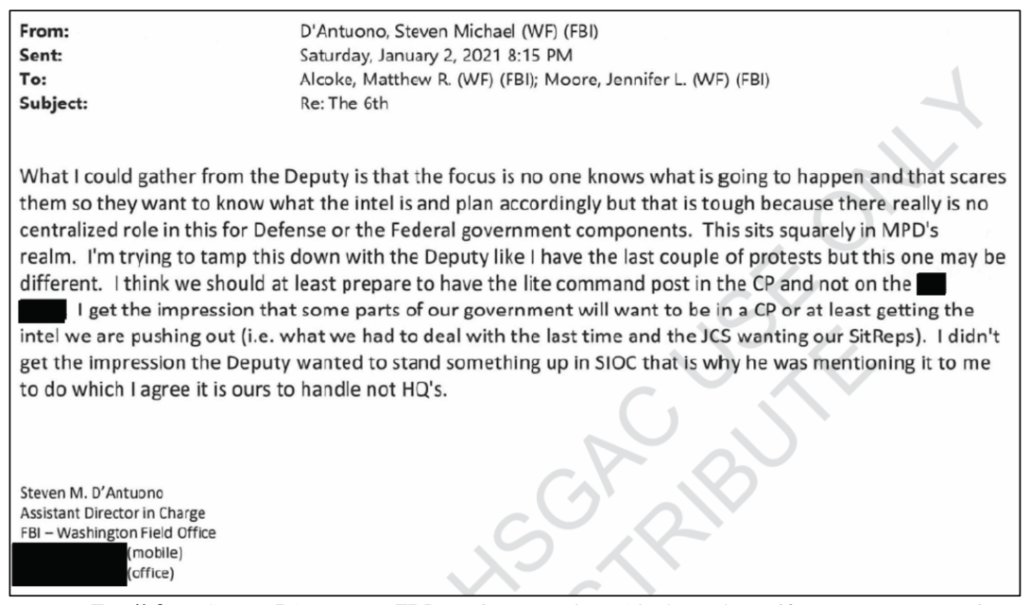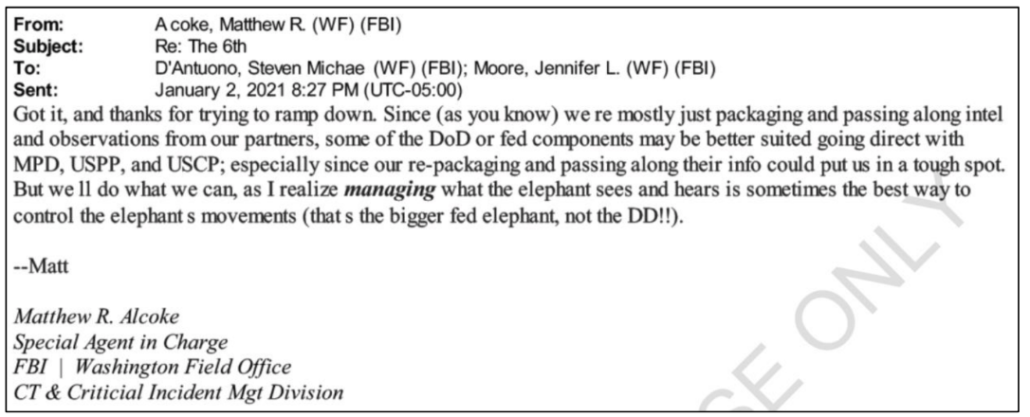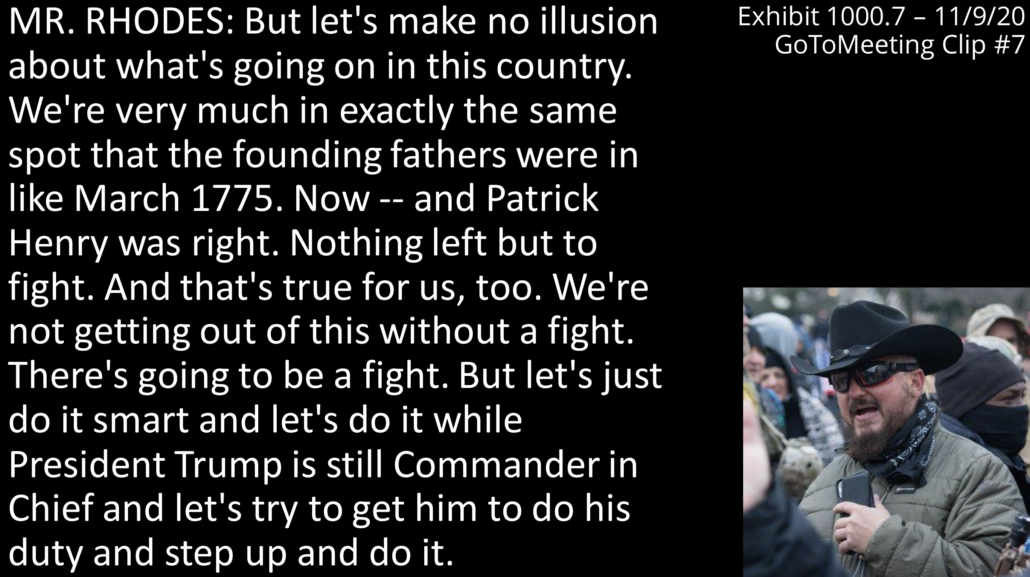According to a report released yesterday by the Senate Homeland Security and Governmental Affairs Committee (HSGAC), on January 2, 2021, then FBI Washington Field Office Assistant Director Steve D’Antuono came away from some kind of exchange with then Deputy Director David Bowdich and described to two top WFO officials, Matthew Alcoke (in charge of counterterrorism) and Jennifer Moore (in charge of intelligence) how he tried to “tamp down” concerns about or plans for January 6.
Alcoke thanked D’Antuono for “ramp[ing] down” expectations, since really all the FBI’s WFO was doing was passing on information from partners like the DC Cops and Capitol Police.
Alcoke then made a shocking suggestion about intelligence sharing:
[M]anaging what the elephant sees and hears is sometimes the best way to control the elephant’s movements.
He seems to have suggested that the FBI might manage how the Federal government would respond to January 6 by managing what kind of intelligence the FBI passed on — and his assumption was that the FBI was only passing on intelligence from partners, not collecting any of its own.
It turns out that the Federal government — that elephant Alcoke imagined he might control — didn’t respond, not adequately. In the aftermath of that shoddy response, D’Antuono claimed that the FBI had seen nothing other than First Amendment protected activity.
During a briefing with reporters on Friday, Steven D’Antuono, FBI Washington Field Office assistant director in charge, told reporters that the bureau’s threat assessments leading up to Wednesday’s mobbing of the Capitol showed “there was no indication that there was anything other than First Amendment protected activity.”
Virtually every Federal official blamed local cops and the Capitol Police, insisting the Feds weren’t supposed to be the ones moving at all, the Capitol Police were.
D’Antuono, we’ve since learned, repeatedly tried to limit the investigation in the aftermath, playing a key role in thwarting any investigation into Trump’s actions for ten months.
Manage the elephant by controlling what it sees and hears.
A day after D’Antuono and Alcoke discussed tamping or ramping down, WFO personnel sent D’Antuono, Alcoke, and Moore a summary describing the following open source intelligence:
On January 3rd, an internal WFO email marked “for FBI internal use only” cited “unsubstantiated” open-source reporting that “ranges from threats to the DC water supply to armed insurrection to various groups threatening to kill those with opposing viewpoints.”156 Among the reports cited, the email noted an open-source post regarding January 6th that said “[i]t needs to be more than a protest. We need to kick doors down and fuck shit up” and another user commented, “will kill if necessary.”157
Another social media post stated, “I’m just waiting for the 6th so I can 1776 them… January 6th we burn the place to the ground, leave nothing behind.”158
The internal FBI-WFO email noted that a tipster reported that individuals on fringe websites were discussing an overthrow of the government if President Trump did not remain in office, and stated “[d]ate of attack 01/06.”159 A Parler user stated, “[b]ring food and guns. If they don’t listen to our words, they can feel our lead. Come armed.” 160
The email also reported social media posts that noted plans to bring firearms into the District and “set up ‘armed encampment’ on the [National] Mall,” and that the Proud Boys planned to “dress ‘incognito’ in order to more effectively target ‘antifa’ in the city.”161
A tipster from Georgia told FBI that the Proud Boys were planning to come to D.C. on January 6th and warned “[t]hese men are coming for violence.” 162 Another tipster told FBI that a Proud Boy told her they were planning an attack on January 6th to shut down the government. 163
Another tip stated “there is a TikTok video with someone holding a gun saying ‘storm the Capitol on January 6th.’”164
As the HSGAC report notes, even in spite of the two warnings about the Proud Boys and threats of violence, WFO concluded that this described just First Amendment protected activities.
Despite all of that reporting, the FBI summary concluded, “FBI WFO does not have any information to suggest these events will involve anything other than [First Amendment] protected activity” and that FBI had “identified no credible or verified threat to the activities associated with 6 January 2021.”165 This was also despite the fact that the Proud Boys were known to engage in violence, including at protests in Washington, D.C. in late 2020.166
As Alcoke described, the FBI marked the summary of these warnings “Internal” because sources were sensitive about sharing it outside the FBI.
A day after discussing “tamp[ing] down” concerns with Bowdich, D’Antuono just sent this entire email to the Deputy Director.
I just sent the whole thing, I don’t want him getting a sanitized version of events.
This is a report that attempts to do what January 6 Committee largely abdicated doing, looking at intelligence failures in advance of January 6.
The House Select Committee’s final report found that President Trump engaged in a multipronged effort to overturn the 2020 election by knowingly disseminating false and fraudulent allegations, pressuring state officials to submit false elector slates, pressuring DOJ officials to make false statements alleging election fraud, and calling on supporters to join him in Washington, D.C. on January 6 th and subsequently encouraging them to march on the Capitol.23 The House Select Committee’s report largely focused on President Trump’s role in attempting to overturn the 2020 election, and only briefly discussed federal intelligence efforts in the lead-up to the events of January 6th . 24 The House Select Committee report found that intelligence agencies, including FBI and I&A, had received intelligence on the potential for violence at the Capitol.25 This intelligence included discussions of the Capitol complex’s underground tunnels alongside violent rhetoric, information on the movements of violent militia groups like the Proud Boys and Oath Keepers, and numerous social media posts discussing storming the Capitol.26 The report also found that security agencies did not adequately prepare for and respond to the threat.27
At the direction of U.S. Senator Gary Peters, Chairman of the Homeland Security and Governmental Affairs Committee (HSGAC), and following the Committee’s initial review of the security, planning, and response failures in advance of and during the January 6th attack, Majority Committee staff conducted a subsequent review focused on the intelligence failures leading up to the attack on the U.S. Capitol on January 6th.
What it describes is utterly damning.
Yet, in spite of a laudable effort to do what J6C didn’t do, there are obvious gaps.
First, as described, HSGAC met the same kind of stonewalling others received.
The Committee received responses to many of its questions and numerous document productions from the agencies in its investigation, including DOJ-FBI and DHS-I&A. However, at various points throughout its investigation, the Committee encountered significant delays, incomplete responses, denied document requests (including documents required to be provided to the Committee under federal law), and refusals to make certain witnesses available to the Committee for interviews. The Committee sought to obtain the necessary information through voluntary compliance by the agencies in its investigation, but this lack of full cooperation hinders the ability of the Committee, and Congress more broadly, to effectively and efficiently conduct legitimate oversight of the Executive Branch.
The Chair of HSGAC, Gary Peters, has broad subpoena power. Yet this report remains wildly inadequate to the task of cataloging FBI’s failures to prevent January 6.
Worse, there are several known intelligence problems that it doesn’t address.
For example, it doesn’t chase down warnings floated in both militia leader trials in the last eight months.
It doesn’t pursue what happened after Oath Keeper “Abdullah Rasheed” called into an FBI tip line reporting on the November 9, 2020 GoToMeeting call in which Stewart Rhodes started talking about a revolution.
Listening to the meeting was Abdullah Rasheed, a Marine Corps veteran and a member of the far-right group from West Virginia. During testimony on Thursday at the trial of Mr. Rhodes and four of his subordinates, Mr. Rasheed told the jury that he was so disturbed by what he heard during the meeting that he recorded the conversation and ultimately called the F.B.I. to alert them about Mr. Rhodes.
“The more I listened to the call,” he said, “it sounded like we were going to war against the United States government.”
The testimony by Mr. Rasheed, a heavy-equipment mechanic, was clearly intended to bolster accusations by the government that Mr. Rhodes and his co-defendants — Kelly Meggs, Kenneth Harrelson, Jessica Watkins and Thomas Caldwell — committed seditious conspiracy by using force to oppose Mr. Biden’s ascension to the White House.
[snip]
On Tuesday, prosecutors at the Oath Keepers trial played several clips of Mr. Rasheed’s recording for the jury. The jurors heard Mr. Rhodes make baseless claims about foreign interference in the election and declare that he would welcome violence from leftist antifa activists because that would give Mr. Trump an excuse to invoke the Insurrection Act and call on militias like his own to quell the chaos.
“We’re not getting out of this without a fight,” Mr. Rhodes said. “There’s going to be a fight. But let’s just do it smart, and let’s do it while President Trump is still commander in chief.”
While Mr. Rasheed initially called an F.B.I. tip line to complain about Mr. Rhodes not long after the meeting took place, the bureau did not reach out to him until March 2021, two months after the Capitol was attacked. He also tried to warn other law enforcement agencies, he testified, writing to the Capitol Police that Mr. Rhodes was “a friggin’ wacko that the Oath Keepers would be better without.”
It doesn’t consider whether Shane Lamond, Enrique Tarrio’s MPD buddy who was charged in May with obstructing the investigation into Proud Boy activities in December 2020, tainted FBI’s own understanding of what would occur on January 6.
It only mentions the FBI’s own informants once, describing how FBI’s confidential human sources led the Bureau to believe the number of “protestors” on January 6 would be lower than in November and December — something any passing glance at social media would have debunked.
WFO sent an email that afternoon that appeared to rely only on its confidential human sources and other investigative leads, concluding, “[a]s of today, WFO has no information indicating a specific and credible threat. All [confidential human sources] and Guardians are not indicating anything specific and credible. Most of what WFO is seeing are random chatter with no specificity. […] WFO expects the number of participants to be fewer than the previous times – each time the numbers get smaller.”174
Most importantly, it doesn’t consider how FBI’s decision to pay a bunch of Proud Boys to inform not on the Proud Boys, but on Antifa, guaranteed that FBI would wrongly see things in terms of protestors and counter-protestors. Two witnesses testified at the Proud Boy leader trial that they were never asked to — nor would they have agreed to — inform on their buddies. Descriptions of seven other FBI informants similarly suggest the FBI had tasked a bunch of Proud Boys and friends to narc out Antifa.
If you pay a bunch of gang members to tell the FBI that their largely manufactured adversaries are the same kind of threat, rather than paying them to tell you about the attack on the Capitol the gang has planned, you have tainted your understanding of things at the outset.
And not even the behavior of those with good intelligence on the far right — those very same counter-protestors — led the FBI and DOJ to reconsider that understanding. When anti-fascists didn’t show up, DOJ concluded nothing would happened, not that the people who really did track what the far right had in mind had concluded that January 6 would be something different.
Former Principal Associate Deputy Attorney General Richard Donoghue also told the Committee that then-FBI Deputy Director Bowdich gave a briefing the morning of January 4th to Acting Attorney General Rosen and Donoghue regarding January 6th, and that while they recognized the potential for violence, they felt “relief” that counter-protesters were not expected to attend in large numbers, as there would likely not be “a situation that concerned us so much, where you would have two different political factions fighting in the streets.”324
The HSGAC Report scratches the surface of how badly FBI did in advance of January 6. It suggests that FBI affirmatively tried to prevent the Federal government from responding with due concern.
But it doesn’t begin to consider how the FBI’s own relationship with the Proud Boys, in which the Bureau deemed the militia that would lead the attack on the Capitol as partners rather than adversaries, guaranteed that the FBI would miss the attack.








